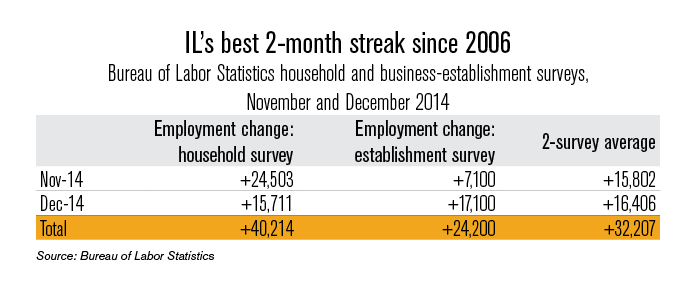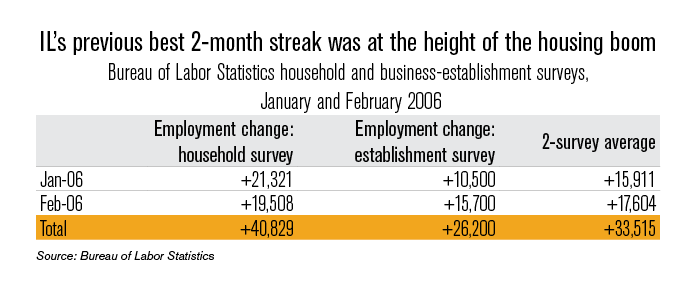After 2 historic months of jobs growth, Illinois still lagging
The two months since the election have been the Land of Lincoln’s best stretch of employment growth in the post-recession era. But the state’s sudden job-creation steam will run out without a healthy fuel of economic-reform policies.
Job creation in Illinois has been a positive surprise in the two months since the Nov. 4 elections. While the sudden good news could be an aberration, it’s also possible that forward-looking businesses breathed a sigh of relief at the outcome of the gubernatorial election, which was expressed through more hiring.
The Bureau of Labor Statistics, or BLS, household survey shows how many Illinoisans are working, while the BLS business-establishment survey indicates how many new positions Illinois businesses have added. Over the long term, the surveys track each other. With both surveys taken in combination, the two months since the election have been the Land of Lincoln’s best two-month effort in the entire post-recession era.
The two-month stretch to end 2014 is also Illinois’ second-best two-month performance of this millennia. The only time in the last 15 years Illinois performed so well on both economic surveys was in the first two months of 2006, during the heyday of the housing bubble.
This is welcome news in a state where economic opportunity has been severely lacking. However, even if this two-month success is the result of regime confidence, Illinois’ sudden job-creation steam will run out without a healthy fuel of economic-reform policies.
Furthermore, Illinois still lays claim to the worst recession recovery in the nation. According to the BLS household survey, there are still 216,000 fewer Illinoisans working than when the Great Recession began, the worst of any state and one of only 22 states that still have fewer people working than when the recession started.
The business-establishment survey for the 2008-2014 period shows 114,000 fewer payroll jobs in Illinois than when the recession began, the second-worst record of any state, and one of only 15 states yet to break even on the recession. Only New Jersey is down more payroll jobs.
Given the U.S. is overdue for a recession, enacting a pro-growth tax policy and replacing Illinois’ smothering regulatory environment are critical for locking in current gains and weathering future storms.
Illinois can start by reversing its reputation as a hazardous state for small businesses, which earned the state an “F” for small-business friendliness in 2014. This can be done by enacting a legislative agenda for entrepreneurs, along with encouraging local economic reforms to foster startups and innovative business models.
Maintaining a steady stream of positive employment news, something the state hasn’t seen in nearly a decade, can only be achieved through these types of pro-growth reforms.


